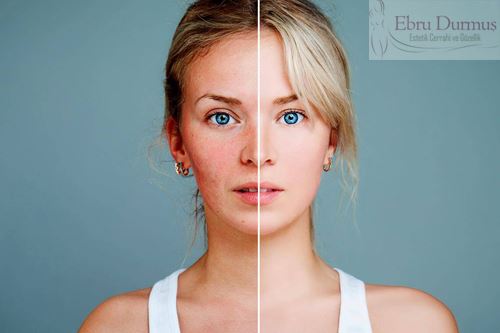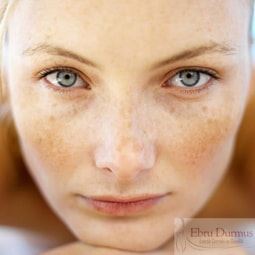Spots on the skin may occur due to various reasons. These spots, which are darker and different from the natural skin tone, can negatively affect daily life. Although they do not pose a serious health risk, especially spots on the face may cause a loss of self-confidence. For this reason, pigmentation treatments are among the most commonly performed aesthetic procedures today.
Sun exposure, aging, pregnancy, different hormone treatments, and medications such as birth control pills lead to an increase in melanin, the substance responsible for skin color, which in turn causes pigmentation on the skin. These spots may sometimes be genetic or develop later in life, and it is also more likely to see an increase in pigmentation with aging. Let’s take a closer look at the four most common types of spots today.

Birthmarks: Birth control pills used before pregnancy, hormonal changes during pregnancy, and psychological factors can cause pigmentation.
Sunspots: Pigmentation that occurs in those who stay under the sun for a long time without using sunscreen; these are formed as the skin thickens to protect itself from sun rays.
Allergic Spots: Allergic pigmentation caused by creams applied to the skin or certain foods, often leading to redness and blisters. If they appear persistently, treatment is required.
Freckles: Commonly seen around the nose and cheeks, appearing as light or dark spots that vary seasonally.
Pigmentation Treatments and Methods
Our aesthetic center first determines the cause of the pigmentation on your skin and chooses the treatment method accordingly. The important point here is both the cause of the pigmentation and the treatment method to be applied. At Dr. Ebru DURMUŞ Center, we offer various treatment methods to our valued patients. By applying methods such as fractional laser, dermaroller, peeling, and radiofrequency, we aim to remove pigmentation on your skin in a short time. Our expert doctors will assist you in this matter.
How Can You Prevent Pigmentation?
As long as you take care of your skin and keep it clean, you can prevent pigmentation, although this may not be a definitive solution. If you do not keep your skin clean, you may face not only pigmentation but also problems such as acne and pimples. To eliminate all the factors that overshadow your beauty and achieve the best possible results, it is essential to determine the most suitable pigmentation treatment for your needs.
Methods Used in Pigmentation Treatments
At Dr. Ebru DURMUŞ, we use three effective pigmentation removal methods to help you achieve smooth skin. You can safely undergo mesotherapy, chemical peeling, and CO2 laser treatments.
CO2 Laser Pigmentation Treatment
In laser pigmentation treatment, lasers that target pigment and lasers that resurface the skin are used. These lasers deliver very short bursts that break down the pigment cells effectively. Since the bursts are extremely short, only the pigment cells are affected, while the surrounding tissue remains unharmed. Such lasers also have the property of promoting skin regeneration.
Mesotherapy
Mesotherapy is a procedure commonly used for sun-induced pigmentation. It involves injecting small amounts of antioxidants such as Vitamin C, glutathione, tranexamic acid, pyruvic acid, and salmon extract under the skin, which helps lighten pigmentation.
Chemical Peeling
 There are many different chemical peeling applications. Peeling products used in treatment are effective in pigmentation by suppressing pigment synthesis in pigment-producing cells, increasing collagen production, and promoting cell renewal. Depending on the product used, the peeling interval varies between 7 and 20 days. The number of sessions also depends on the treatment and the skin’s reaction, typically ranging from 2 to 6 sessions. A slight burning or stinging sensation may occur during the procedure, which is relieved with local cooling. After the procedure, patients can return to their normal daily routine. With regular sessions, fine lines and wrinkles can be reduced, brown spots (pigment irregularities) can be treated, and acne scars can be improved.
There are many different chemical peeling applications. Peeling products used in treatment are effective in pigmentation by suppressing pigment synthesis in pigment-producing cells, increasing collagen production, and promoting cell renewal. Depending on the product used, the peeling interval varies between 7 and 20 days. The number of sessions also depends on the treatment and the skin’s reaction, typically ranging from 2 to 6 sessions. A slight burning or stinging sensation may occur during the procedure, which is relieved with local cooling. After the procedure, patients can return to their normal daily routine. With regular sessions, fine lines and wrinkles can be reduced, brown spots (pigment irregularities) can be treated, and acne scars can be improved.